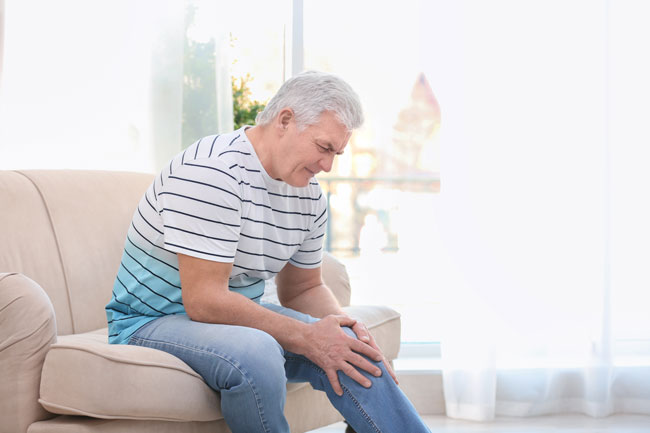Osteoarthritis (knee pain)/OA is the most common form of arthritis. It is a degenerative joint disease or “wear and tear” arthritis. OA affects over 30 million US adults. It occurs most frequently in the hands, hips, and knees. OA is caused by damage or breakdown of joint cartilage between bones. The cartilage within a joint begins to break down and the underlying bone begins to change. These changes usually develop slowly and get worse over time. OA can cause pain, stiffness, and swelling. In some cases it also causes reduced function and disability; some people are no longer able to do daily tasks or work.
Signs and symptoms of OA
- Pain or aching.
- Stiffness.
- Decreased range of motion (or flexibility).
- Swelling.
The risk factors for OA
- Joint injury or overuse—Injury or overuse, such as knee bending and repetitive stress on a joint, can damage a joint and increase the risk of OA in that joint.
- Age—The risk of developing OA increases with age.
- Gender—Women are more likely to develop OA than men, especially after age 50.
- Obesity—Extra weight puts more stress on joints, particularly weight-bearing joints like the hips and knees. This stress increases the risk of OA in that joint. Obesity may also have metabolic effects that increase the risk of OA.
- Genetics—People who have family members with OA are more likely to develop OA. People who have hand OA are more likely to develop knee OA.
- Race— Some Asian populations have lower risk for OA.
Treatment for Osteoporosis of the Knee
Surgery is typically a last resort for knee osteoarthritis (knee pain)/OA. Before knee replacement surgery, your doctor will most likely suggest non-surgical treatments for knee OA, such as pain relievers and nonsteroidal anti-inflammatory medications, physical therapy with muscle strengthening exercises, and recommendations to reduce risk factors such as weight loss.
One of the non-surgical treatment methods doctors may offer when a patient is unable to control osteoarthritis (knee pain) pain with pain-relieving medication or other nonsteroidal anti-inflammatory drugs (NSAIDs), is a viscosupplementation treatment. Viscosupplementation has been gaining more prominence, it is a simple procedure and can be performed in outpatient clinics. It provides benefits regarding pain and function.
Viscosupplementation is an intra-articular hyaluronic acid injection. In a healthy joint, a thick substance called synovial fluid provides lubrication, allowing bones to glide against one another. Synovial fluid also acts as a shock absorber. In people with osteoarthritis (knee pain), a critical substance in synovial fluid known as hyaluronic acid breaks down. Loss of this hyaluronic acid contributes to joint pain and stiffness. Viscosupplementation replenishes hyaluronic acid in the synovial fluid, which increases lubrication, improving movement and reducing pain.
Our medical team treats osteoarthritis of the knee exclusively at our Morrow location. Please call our Morrow office at (770) 824-4343 to schedule your knee osteoarthritis appointment today! The address for our Morrow location is 6053 Jonesboro Rd. Morrow, GA 30260. Click here for directions.


